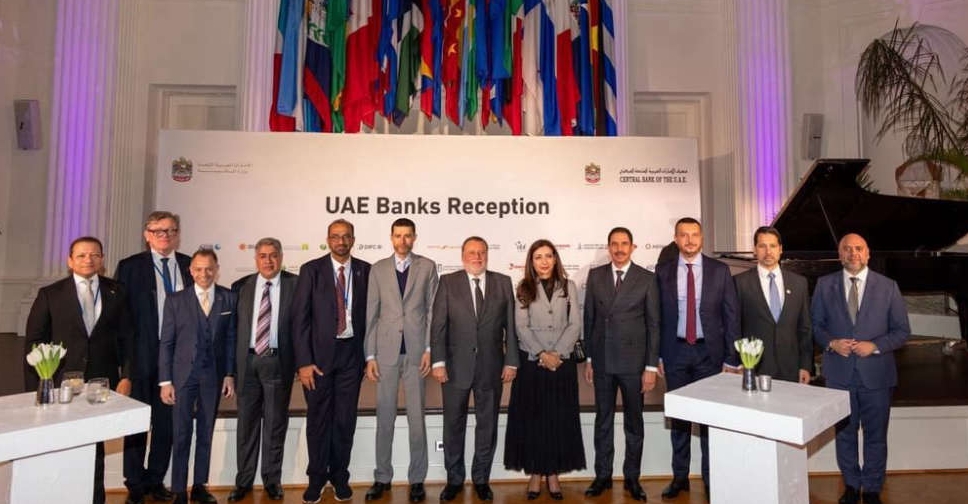
The UAE, represented by the Ministry of Finance and the UAE Central Bank, concluded its participation in the Annual Meetings of the International Monetary Fund (IMF) and the World Bank Group (WBG), held in Washington from October 21-26.
From economic outlook to poverty eradication, economic development, and international aid, the meetings covered a broad spectrum of global issues. Participants also discussed challenges facing the global financial system with international economic leaders, including finance and development ministers, central bank governors, private sector executives, and civil society representatives.
The Minister of State for Financial Affairs, Mohamed Hadi Al Hussaini, highlighted the UAE’s pivotal role in promoting international cooperation to tackle global economic challenges, reiterating the country’s commitment to fostering financial stability and sustainable development on both regional and global levels.
He explained that the UAE is dedicated to promoting innovation in the financial sector, building digital infrastructure to boost financial inclusion, and deepening collaboration between the public and private sectors to support long-term development goals.
“The UAE will continue to support international initiatives aimed at driving sustainable development by investing in innovative financial solutions that not only bolster economic growth but also create new opportunities for progress. By staying committed to the Paris Agreement, we work with global partners to ensure the sustainability of the global economy and address the rapid pace of economic and technological change,” Al Hussaini continued.
During the annual meetings, Al Hussaini chaired the main session of the 2024 WBG-IMF Development Committee meeting. At the start of the 110th Committee meeting, his fourth as chair, he expressed deep appreciation for the collective efforts made during the three previous meetings under his leadership.
Discussions at the meeting focused on strengthening the World Bank Group’s development finance to address global challenges such as climate change and digital transformation. The session also highlighted the need for a comprehensive approach to bolster the financial capacity of international financial institutions, with an emphasis on operational efficiency and technology.
The meeting covered innovative financial solutions, including green bonds, to manage debt while supporting environmentally friendly projects. Al Hussaini also noted the World Bank Group’s substantial contributions, including $330 billion in development finance and $90 billion in climate finance over the past three and a half years.
In addition, the International Monetary and Financial Committee, which plays a central role in shaping international financial and economic policies, held a session during the meetings. Discussions examined the IMF’s assessment of the global economy and financial markets, with attention to the slowdown in global trade growth, geopolitical tensions, and supply chain issues.
Al Hussaini also noted the impressive resilience of advanced, emerging, and developing economies despite global challenges. He emphasised that the IMF’s role in supporting the global economy is crucial to avoiding a path of low growth and high debt, given the moderate growth outlook and record levels of global public debt.
He also stressed the importance of multilateral cooperation in safeguarding global trade, addressing debt vulnerabilities, ensuring energy security, and financing climate change adaptation.
Additionally, the UAE delegation took part in several key meetings, including the fourth meeting of G20 finance ministers and central bank governors under Brazil’s presidency. The session discussed ways to enhance the efficiency of multilateral development banks, improve their responsiveness to global needs, and strengthen government-private sector cooperation to address development priorities. It also highlighted the importance of implementing the multilateral development banks’ roadmap approved by the G20 through effective monitoring and reporting mechanisms.
Members also examined prospects for global financial stability and celebrated the achievements of the G20 Financial Track since its inception 25 years ago.
During the meeting, Al Hussaini highlighted the UAE’s advancements in digital infrastructure and financial innovation and the country’s efforts to promote financial inclusion through advanced financial technology. He reiterated the UAE’s commitment to the Paris Agreement and underscored the national contributions made to achieve these goals.
The UAE delegation also participated in meetings with finance ministers and central bank governors from the Middle East, North Africa, and Pakistan, a joint meeting with counterparts from the GCC, Caucasus, and Central Asia at the IMF, as well as bilateral discussions with Pakistani and Indian delegations.
On the sidelines, the Ministry of Finance, in collaboration with the Central Bank of the UAE and the UAE Embassy in Washington, hosted a reception for UAE banks to enhance networking and engagement with participating delegations and senior officials from international financial institutions and banks, while showcasing the UAE financial sector's leading role on the global stage.


 UK's Jaguar Land Rover to halt US shipments over tariffs
UK's Jaguar Land Rover to halt US shipments over tariffs
 US starts collecting Trump's new 10% tariff
US starts collecting Trump's new 10% tariff
 Nasdaq set to confirm bear market as Trump tariffs trigger recession fears
Nasdaq set to confirm bear market as Trump tariffs trigger recession fears
 Dana Gas and Crescent Petroleum exceed 500M boe in Khor Mor field
Dana Gas and Crescent Petroleum exceed 500M boe in Khor Mor field



